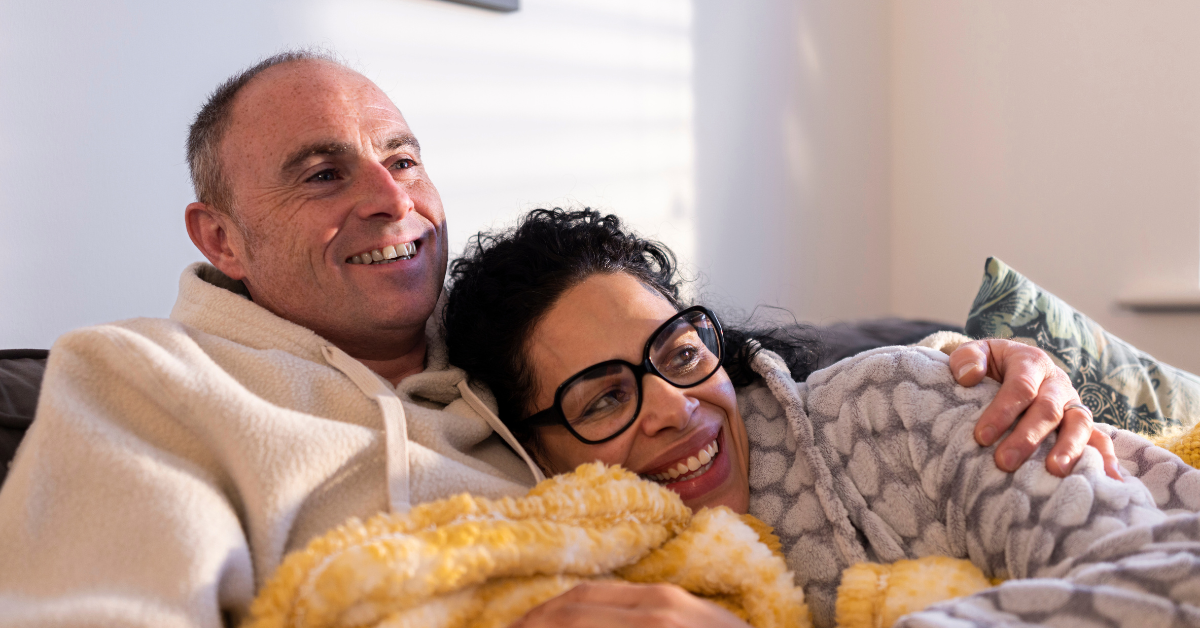
How diabetes affects intimacy and how you can better navigate with your partner.
With diabetes present it’s never just you and your partner. There’s always that third party in the room, seeking (sometimes demanding) attention. And while managing diabetes can’t be ignored, it shouldn’t be allowed to derail your intimate relationships. For each of us the solution will be personal, nevertheless it is possible to strike some kind of balance between enjoying intimate relationships and managing diabetes at the same time.
Always On Our Minds
You and your partner’s desire for intimacy – physical and emotional – is ever present. Also ever present are diabetes and its need to be actively managed. It can feel like you’re stuck in a constant tug of war. How can I give my partner my full attention and affection when in the back of mind we’re wondering if a hypo is about to happen? Or if a CGM alarm will go off? Or if we’ll feel pain or experience dysfunction?
Distraction happens even before we get started. And the tender closeness we anticipate too easily evaporates into frustration and shame.
Physical Effects of Diabetes
The physical effects of diabetes on sexual health are well documented and need to be paid attention to.
Over time diabetes affects vascular health, causing nerve damage and disrupting blood flow. Nerve damage reduces sensitivity to touch and stimulation. Disruptions to blood flow cause damage to our sexual organs and how they function. Vaginal dryness, erectile dysfunction, and penile curvature can develop, making intercourse itself difficult and painful.
In turn, these physical effects can undermine sexual desire and response.
Psychological Impacts of Diabetes
Diabetes’ psychological impacts are also well documented, but not often discussed in the context of sexual health.
Living with diabetes can disrupt self-confidence and feeling comfortable in our bodies. These experiences play out in our intimate relationships as well as our general social life. Anxious feelings about how diabetes might “get in the way” are common. Whether the worry is having to stop to check glucose levels or accidentally dislodging an infusion set diabetes has its own way of getting in our heads.
These thoughts and feelings can leave us feeling undesirable and unlovable. And while it might feel like avoiding intimacy all together is the easiest route to take, the great irony of this situation is that having close relationships can actually support better diabetes and overall health management. So, what can seem like the easy fix actually can be detrimental in the long run.
Coping Strategies
Everyone deserves to love and be loved. Intimate relationships are one way we can experience close connections with others and support our overall physical and mental health. But these experiences and benefits require extra effort and commitment when diabetes is present.
I hate to say it, but intimate relationships present yet another diabetes problem-solving opportunity. Here are a few approaches to consider.
Come from a place of empathy and compassion.
We must take into account not just our own desires, feelings and experiences, but our partner’s as well. In order to experience the closeness we desire, both partners need to feel accepted and that they can trust each other.
Speak openly and truthfully.
Honest, open communication is key in any relationship. But even more so in an intimate relationship. Open communication makes it possible to understand what your partner is feeling and thinking, what they like and dislike, what they want, etc. It can reduce frustration and short circuit anger and resentment. In being truthful, we build the trust and safety needed to let ourselves be vulnerable.
Explore alternatives.
When one approach isn’t working, try something else. Affection can be demonstrated and felt in a lot of different ways. Everything from a brush of the skin to a meaningful gaze can create that warm feeling that comes from intimate connection. Finding your groove with your partner can be part of the enjoyment that comes from growing intimacy.
Take the long view.
Be patient. Give yourselves some grace. What happened today, won’t necessarily happen tomorrow. Sometimes things don’t go as planned and it’s no one’s fault. Accept that our bodies and emotions can change over time, making what was pleasurable yesterday less so today.
Seek medical help, when needed.
If you are experiencing some form of sexual dysfunction, talking with your doctor is the most beneficial route to take. With medical advice and treatment the source of the dysfunction can be addressed directly and effectively.
Life with diabetes brings with it many challenges. But we shouldn’t let diabetes get in the way of developing and enjoying intimate relationships. Relationships that can add so much to our quality of life.

